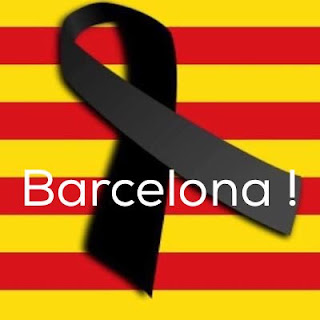It has been all over the news: this past Thursday, Aug. 17 a van entered Las Ramblas in Barcelona at about 4.50 p.m. (1450 GMT) and plowed into a crowd of tourists and local people strolling down the popular walkway, killing thirteen and wounding more than one hundred. Dead and injured include citizens of 34 countries. The driver fled on foot and is yet to be found. A few hours later in Cambrils, 120 km (75 miles) down the coast from Barcelona, five assailants drove a car jumping a police control onto pedestrians and police officers. A Spanish woman was killed. The Catalan police, the Mossos d'Esquadra Police shot dead five people. Soon the perpetrators were identified as Moroccans and the attack was considered jihadist connected.
The terrorist cell perpetrating the attacks in Barcelona and Cambrils kept similarities with the one responsible for the March 11, 2004 train bombings. It involved close to a dozen of members and, as some specialists have pointed out, they have an initial plan to build an enormous bomb carried in a big truck, using more than one hundred propane and butane canisters, very popular in Spain as a source of energy for kitchens and heating. They could not rent a truck because they lacked the special driving license needed. Then decided to use two mid-size vans, but in manipulating the explosives in a hideout house in Alcanar, the last Catalan village before Valencia, something went wrong and they blew themselves up, resulting in one dead and one seriously wounded. Today the remains of a third person have been found in the ruins of the house. That happened the day before.
Apparently, without the explosives, they resorted to carrying out the driving-through attack in the Ramblas. There is some coincidence of the hour (17.00) the day the 17th, and the year 2017. The members left, went on and tried a second attack in Cambrils waterfront. Intercepted at a police control, they overrun a policeman and some bystanders, wounding several of them. In their fleeing, they hit some obstacle and the car overturned. The terrorists got out of the car and it was apparent they were carrying explosive vests, later found to be fakes. Then a policeman armed with a long weapon (probably an SCAR-L rifle) shot and killed four of the five occupants of the car, the fifth being killed shortly afterward by other plainclothes members of the Mossos police. Four possible accomplices have been detained and at least one has escaped and is being the objective of a massive manhunt all over Catalonia.
Still doubts about the whereabouts of the Imam of the town of Ripoll where most of the identified terrorist are from, the principal suspect of indoctrinating and organizing the terrorist cell. Some findings in the rubble of the house of a possible third person may suggest it could be the Imam.
The rapid and well-organized response of the police forces and the rescue and emergency services in Barcelona have been praised by everybody. For seven long hours, only the Catalan government public officials were in charge and offering information to the people and support to the victims. It took that long for the Spanish authorities to show themselves and react to the tragedy. The Spanish Royal house uttered a half-baked twit message unbecoming of the institution and the circumstances.
The Catalan Foreign Minister (a portfolio that officially does not exist for the Spanish government) received at the airport the ministers of the same branch of Germany and France, the lady mayor of Paris went to the Delegation of Catalonia in the French capital, to sign the book of condolences. In Catalonia, for those long hours there was only one state: the Catalan.
Regretfully, several media from Madrid offered twisted pieces of information and misinterpretations (and utter lies and fake news) trying to relate the attacks with the independence movement currently active in Catalonia and aiming to discredit it.
The Catalan people response of solidarity with the victims, and the police and authorities management of the crisis setting apart the tragedy from any other matter, will prompt the opposite effect, increasing the feelings of self-sufficiency and containment of a mature and well-organized society, quite ready to move out by itself.
The next weeks will be determinant, but the path to the independence, even in these dire circumstances, seems to be well set.





No comments:
Post a Comment